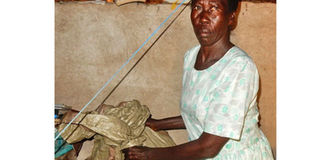Lira farmers shun community stores

Storage. A woman shows where she stores her produce in a grass-thached hut in Adekokwok Sub-county in Lira District. Photo by bill oketch
What you need to know:
- Reason. Farmers say they prefer storing their produce in the house because those managing the stores are allegedly corrupt and incompetent.
Lira. Farmers in Lira District have shunned community warehouses and are storing produce in their houses due to lack of transparency in the management of the storage facilities.
However, agribusiness experts warn that storage facilities in the district may not be effective in enhancing farmers’ access to ready market if not utilised.
Few years ago, development partners such as the World Food Programme (WFP) and the Ministry of Agriculture, Animal Industry and Fisheries, constructed 20 community-level stores in Lira District.
The facilities were handed over to organised groups in 13 sub-counties, including Lira Municipality’s four divisions.
Storage capacity
Each unit has a storage capacity of between 70 and 1,000 metric tonnes expected to support more than 200,000 farmers.
The two stores with a capacity of 1,000 metric tonnes, were constructed with support from the International Fertiliser Development Centre, a science-based public international organisation, and the Ministry of Agriculture, Animal Industry and Fisheries.
They are Norah Agro store in Adekokwok Sub-county and Itek Okile in Barr Sub-county.
Farmers are supposed to harvest crops and store them in community stores as they collectively search for quality produce markets.
A farmer, Ms Vicky Akullo, said many farmers do not have bargaining power because of lack of stores in their communities.
“I keep my produce in the house and take it to Produce Line in Lira Town if I want to sell it,” she said.
Non-functional
The district commercial officer, Mr Santos Olade, said seven out of the 20 stores established in Lira are in sorry state and have become non-functional.
The dilapidated facilities include Okio, Owene, Angwetangwet, Aturi, Akia, Alunya-lo-akwonga and Aromo Cotton Growers.
Alledgedly, farmers are not utilising the stores in good shape.
Farmers say they prefer storing produce in their houses to community-level stores because those managing the facilities are allegedly corrupt and incompetent.
“Many farmers are not using the stores because they have lost trust in the people who are managing the facilities,” Mr Moses Ogwal, the executive director of Meaningful Empowerment for Change and Poverty Alleviation (MECPA), said. MECPA is a community-based organisation in Lira.
Mr Ogwal said farmers elected to manage the stores are not trained.
Ms Harriet Aboko, the Amach Sub-county chief, said her office was informed that the store in their area was being mismanaged.
“We are in the process of rectifying the problem. We first want our people to harvest their crops and we talk to them to utilise the one stock centre (community store),” she said last week.
Lira commercial officer Santos Olade said small scale farmers are still faced with the challenge of storage and access to formal markets.
Ownership wrangles
He said some community stores have been abandoned because they were constructed on private land and those who donated the land are claiming ownership of the stores.
“We are trying to carry out massive sensitisation to make people understand the benefit of collective marketing,” the district commercial officer said, adding that the 20 community stores are even inadequate to support the farmers in Lira.
Lira has a total population of 408,043 people. Out of these, 81 per cent (about 330,514) are farmers, according to the National Population and Housing Census, 2014.
Quality produce
Access to quality produce market is considered an incentive for smallholder farmers to invest their business. But it has remained elusive for reasons that include low production and as well as structural deficiencies such as lack of transport and infrastructure, according to the World Food Programme.
Across the world, smallholder farmers produce much of the food that lands on people’s plates – feeding up to 80 per cent of Asia and sub-Saharan Africa, according to WFP.



